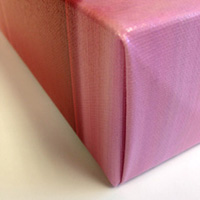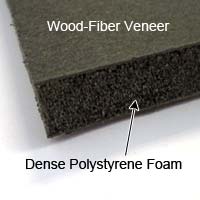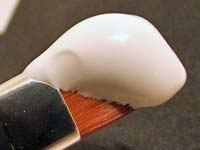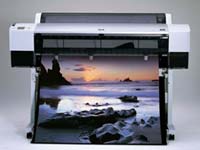| Glossary Of Giclee Terms
[20] |
G
Gallery wrap Gallery wrapping is the method of stretching an artist's canvas so that the canvas wraps around the sides of a wooden frame (called stretcher bars or strainer bars), and securing it to the back.The result is that the hardware (staples or tacks) used for securing the canvas is not visible from the front or sides.
The sides of the canvas are prepared and primed in the same manner as the face. They may be painted a solid color, or painted to continue the image appearing on the face. This method of stretching and preparing a canvas allows for a frameless presentation of the finished painting.
In canvas printing, the term “gallery wrap” refers to an image that appears on the sides of the frame as well as the front. The image on the sides is either a continuation or a reflection of the main image.
Order your gallery wrapped canvas print online today! |
 |
| Gamma Correction Gamma correction is a technique used to adjust the brightness and contrast of digital images to ensure consistent and accurate representation on different display devices. It involves applying a nonlinear adjustment to the pixel values in an image to compensate for the nonlinear response of display devices, such as monitors and printers. Gamma correction helps to maintain the perceptual uniformity of images across different viewing conditions and devices, ensuring that images appear correctly exposed and visually balanced. |
| Gamut Mapping Gamut mapping is a color management process used to adjust or transform the color gamut of an image to match the color reproduction capabilities of a particular output device or color space. It involves mapping colors from one color gamut to another while preserving the overall appearance and visual intent of the original image. Gamut mapping algorithms analyze the color gamut of the source and target devices, then adjust the colors in the image to ensure accurate and consistent color reproduction across different output devices, such as monitors, printers, and digital projectors. |
Gatorboard A panel composed of a thin sheet of dense foam sandwiched between several layers of thick paper. The result is an extremely rigid and durable base for dry mounting fine art prints and photographs, and lamination.
Order online:
3/16 inch Gatorboard
1/2 inch Gatorboard |
 |
Gel Medium Also called acrylic gel medium.
A thick, usually transparent substance that is used to alter the consistency or appearance of acrylic paints. Depending on the type used, a gel medium can add or reduce gloss, adhere mixed media or extend the amount of paint.
Gel medium is available in matte, gloss and semi-gloss and some are self-levelling (when poured, create a smooth surface without manual smoothing).
When used on their own, gel medium creates a textured surface on canvas prints that dries clear, effectively enhancing brush strokes and highlighting portions of the art where the application is thicker. |
Gesso A chalk-based paint mixture that is used to create texture on canvas surfaces prior to, or in lieu of, painting. Due to its absorbency, it can serve as a base for most types of paint.
Modern acrylic "Gesso" is actually a combination of Calcium Carbonate with an acrylic polymer medium latex, a pigment and other chemicals that ensure flexibility, and ensure long archival life.
It is also used as a base on sculptural work, wall paintings and wood panelling, or for priming blank canvas prior to oil painting. |
 |
Giclée (gee-clay) A digital fine art print made with an inkjet printer. The term is derived from the French gicler (to spray), and refers to the spraying of ink from an inkjet printer onto the printed surface. The earliest giclées were made using Iris printers, which sprayed microscopic drops of color onto a fine art paper or canvas. Capable of displaying the full color spectrum, these artworks have vibrant, brilliant colors, and a velvety texture. This gives the finished product the look and texture of an original painting.
Browse our selection of Giclée canvas prints, and order yours today. |
 |
| Giclée Printmaker A Giclée printmaker is an individual or company specializing in the production of Giclée prints using high-quality inkjet printing technology and archival materials. Giclée printmakers work closely with artists, photographers, and designers to reproduce their original artwork or digital files as fine art prints with exceptional color fidelity, detail, and longevity. Giclée printmakers use professional-grade inkjet printers, archival-quality inks, and premium substrates to ensure that prints meet the highest standards of quality and durability, suitable for display in galleries, museums, and private collections. |
| Giclée Reproduction A Giclée reproduction refers to a fine art print produced using the Giclée printing process to reproduce an original artwork, photograph, or digital image with exceptional color accuracy and detail. Giclée reproductions are commonly used by artists, photographers, and printmakers to create high-quality prints of their original works for distribution, sale, or exhibition. Giclée reproductions preserve the integrity and visual quality of the original artwork, capturing fine details, subtle color variations, and texture with precision and fidelity. They are often produced in limited editions and signed by the artist to enhance their collectability and value. |
| Giclée Varnish Giclée varnish is a protective coating applied to Giclée prints to enhance their durability, longevity, and appearance. It is typically a clear, transparent liquid coating that is sprayed or brushed onto the surface of the print after printing and drying. Giclée varnish helps to protect prints from moisture, UV light, fading, scratches, and abrasion, extending their lifespan and preserving their color accuracy and vibrancy. Varnishes come in various formulations, including matte, satin, and glossy finishes, each offering different levels of sheen and texture. |
| Giclee Giclée (pronounced zhee-klay) is a digital printing process that uses high-quality inkjet printers and archival-quality inks to produce fine art prints with exceptional color accuracy, detail, and longevity. The term "giclée" is derived from the French word "gicler," meaning "to spray," referring to the inkjet printing process used to create prints. Giclée printing is widely used in the reproduction of fine art, photography, and digital artwork, offering artists and printmakers a versatile and high-quality printing solution for producing museum-quality prints on a variety of substrates, including paper, canvas, and specialty media. |
Glazing (1) A technique of applying oil or acrylic color in thin, transparent layers so that the color beneath shows through, modifying the color of the glaze.
(2) The clear cover placed over an artwork within a frame; this may be plastic, plexiglass or real glass. |
| Gloss Finish A gloss finish is a type of surface coating that produces a shiny, reflective appearance on printed materials, such as photographs, artwork, and documents. Gloss finishes are achieved by applying a clear, glossy coating, such as varnish or laminate, to the surface of the printed material. Gloss finishes enhance the vibrancy, contrast, and depth of colors, making images appear more vivid and eye-catching. Gloss finishes are commonly used in Giclée printing to enhance the visual impact and aesthetic appeal of fine art prints, photographs, and reproductions. |
| Glossy Finish A high shine finish like that found on traditional photographic prints and resin-coated surfaces. The high degree of reflect creates very vibrant colors, but can obscure the image in certain lighting. |
| Graphic Design Graphic design is a creative discipline that involves the visual communication and presentation of ideas, concepts, information, and messages through the use of typography, imagery, color, and layout. Graphic designers use a combination of artistic skills, technical expertise, and creative problem-solving to create visual solutions for a wide range of applications, including branding, advertising, packaging, publications, digital media, and web design. Graphic design encompasses various specialties, such as logo design, illustration, typography, layout design, and digital imaging, and relies on both traditional and digital tools and techniques to create effective and visually compelling designs. |
| Grayscale Grayscale refers to an image that consists solely of shades of gray, ranging from black to white, without any color information. Grayscale images are created by representing each pixel in the image with a single value that corresponds to its brightness or luminance level. Higher pixel values represent lighter shades of gray, while lower pixel values represent darker shades of gray. Grayscale images are commonly used in photography, digital imaging, and printing to represent black-and-white photographs, illustrations, and text documents. Grayscale printing techniques, such as Giclée printing, allow for the accurate reproduction of grayscale images with smooth tonal transitions and fine detail. |
| Gridwall panels A metal grid that can be hung on a wall and used for displaying goods. |
| Grommet A grommet is a small metal or plastic ring inserted into a hole in a material, such as fabric, paper, or vinyl, to reinforce the hole or provide a means for attaching or securing the material. Grommets are commonly used in various applications, including banners, signs, tents, curtains, and clothing, where they serve to prevent tearing or fraying of the material around the hole and facilitate the attachment of ropes, cords, or fasteners for hanging, lacing, or securing purposes. |
| Gsm Grams per square meter. A metric measurement of paper density or "weight". |
| Gum Bichromate: Gum bichromate, also known as gum printing, is an alternative photographic printing process that dates back to the 19th century. It involves coating a paper or other substrate with a light-sensitive solution made from gum arabic and potassium dichromate, then exposing the coated surface to ultraviolet light through a negative or transparency. After exposure, the print is developed in water, which dissolves the unexposed areas of the coating, leaving behind a pigmented image. Gum bichromate prints are characterized by their soft, painterly appearance and tonal richness, as well as their potential for experimentation and creative expression. |
|
© 2002-2026 - KeenART Media Ltd.
|
|
| |
|
